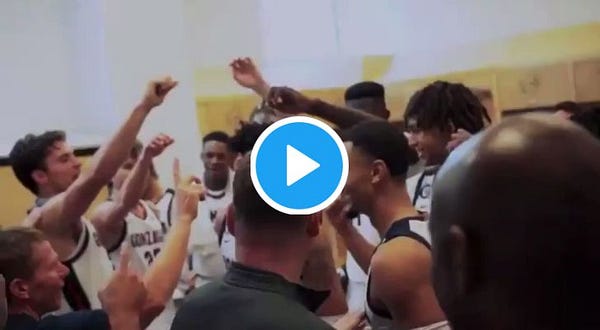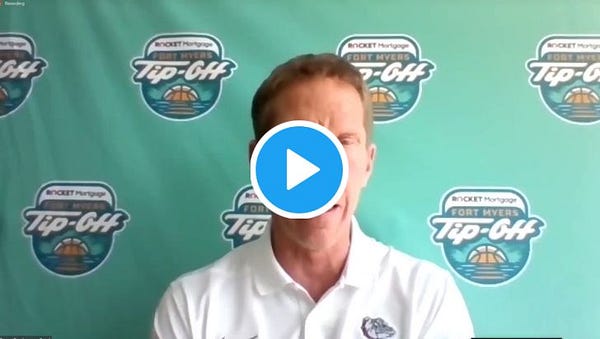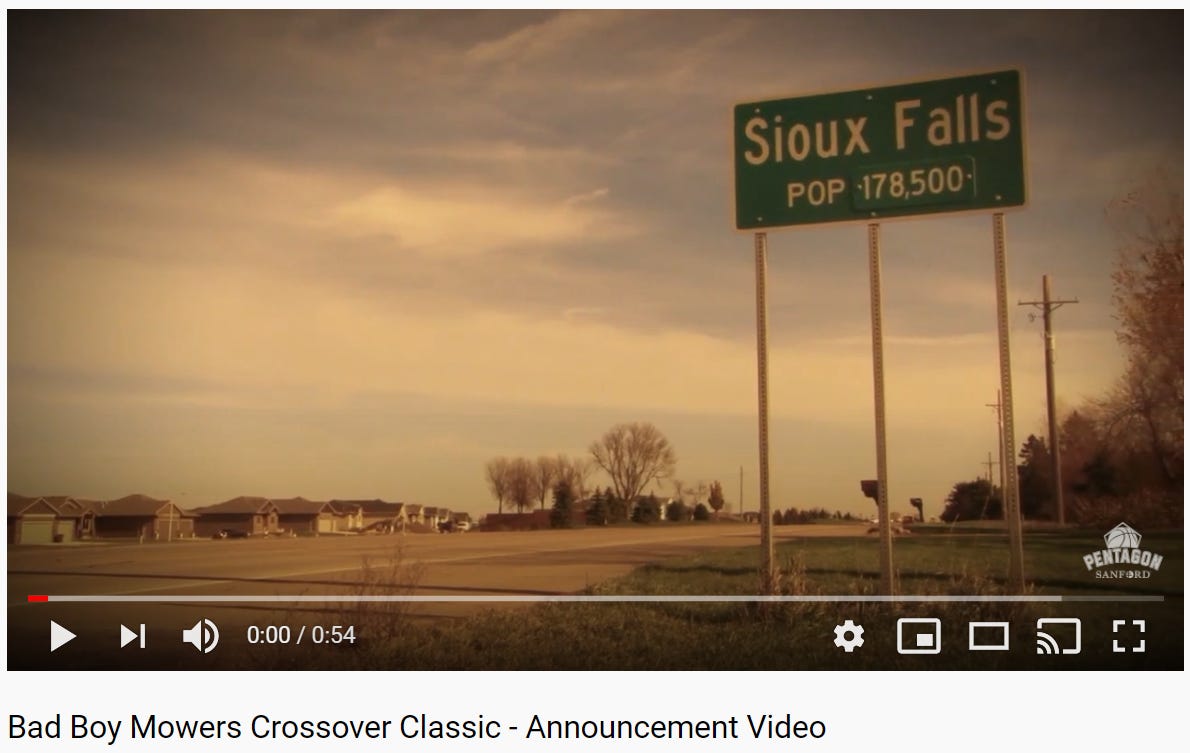(Literal) Zag Fever
PART 2 | Gonzaga Basketball is shedding light on the uneven patchwork of COVID regulations across the nation and how those with power and money get to literally make their own rules.
This is the second piece of a little duet inspired by the start of college basketball amid the pandemic. It probably works as a standalone essay, but if you missed part one, you can read it here.
2. Bubble Boys
This might get long, so let’s quickly set the scene for the controversy and bring people up to speed:
On Thanksgiving Day, the Gonzaga men played a monumental game against blue-blood powerhouse Kansas (#6 in the AP polls), and they won convincingly.
Gonzaga was ranked #1 in the nation in preseason polls and this win proved they deserved to be there. The next morning, before a game against Auburn, Gonzaga quietly said two players were being held out of the game for Covid-19 protocols. When the media asked if the players had tested positive, Gonzaga’s Sports Information Director (a real job) told a local reporter:
Does that wording seem a little … odd … to you? Almost like it was crafted to make it seem as though both tested negative without, you know, actually saying that? Turns out, that’s because:
Two players didn’t test positive … only one did.
Journalists expressed outrage at being lied to. Some fans were upset that Gonzaga played a game despite the positive test. The participating teams seemed strangely sanguine about it (more on that later).
Gonzaga had seemingly done a pretty good job at least appearing to obey best practices. And then this video surfaced:


Yikes. That ain’t proper social distancing, ma.
The discourse was predictable: People calling out Gonzaga for specific and unique recklessness and lies of omission. People saying it was proof the NCAA needed to shut everything down. Plenty of others telling those first two groups to quit being snowflakes and just enjoy the show.
There’s an easy way to write a column about playing sports during a pandemic. It’s about the length of a tweet and you could fill it in like a MadLib:
The NCAA, the Gonzaga athletic department, and Coach Mark Few are _selfless heroes | criminal masterminds_ for the _incredible precautions | unconscionable risks_ they’ve taken to play basketball at a time when we desperately need _hope & normalcy | to stay the hell home_
If you were to fill in your own answers, I think I could use those answers to guess:
How you voted in the election
How many people you had to Thanksgiving
How often you reference “the blockchain” in random conversations
My point is this: The battle lines of this culture war are clearly defined, they are ideologically entrenched, and they don’t seem to be budging. I don’t see much point in chucking one more log into a forest fire.
So let’s keep talking about power.
There will be plenty of criticism of the NCAA and Gonzaga in this column (it will end with a Peter Theil reference, you’ve been warned), so I think it’s only fair to spend a little time up top trying to establish what are undeniably big stakes for the coaches and athletes.
Because even if we conclude that flying young people around the country to some of the biggest coronavirus hotspots in America is a reckless response by middle-aged millionaires who aren’t used to being told “no,” I’d also like to at least make space for the possibility that people might have honest motivations undergirding sketchy decision-making.
Let’s humanize some folks, shall we?
What are they playing for?
RESPECT? | Undeniably, yes.
When the Gonzaga men went to the NCAA Tournament in 1999, it was only the second time in their 92-year history.
21 years later, they’ve been in every single tournament since — a streak surpassed by only three other teams: Michigan State (22), Duke (24), and Kansas (30). Gonzaga’s streak is over twice as long as North Carolina (9) and three-times as long as Kentucky (6).
These are the five most venerated dynasties, the most consistently successful programs and the biggest brands in college basketball history. This is the company Gonzaga keeps now, but there’s an asterisk there.
Gonzaga is the only team on that list without a championship. Gonzaga really wants a championship.
MONEY? | We live under capitalism, so yes, everything is always at least a little bit about money. But I’m going to go out on a limb and say basketball money is a motivation GU, the NCAA and even TV networks would forego if the risks were great enough.
ESPN cancelled a bubble tournament in Florida because they couldn’t guarantee consistent protocols (more on that below), and last season the NCAA cancelled the whole damn tournament! They cancelled March Madness™!
Gonzaga has never been an impulsive organization. I’ve heard rumors there’s an $8 million COVID hole, but that’s a drop in the bucket of a nearly $300 million dollar annual budget and nearly $600 million cash-on-hand as of 2019 (according to the school’s audited financials).
I can’t imagine them risking the brand damage that would come from a dead or seriously sick student athlete just to plug a short-term, black-swan-unpredictable financial hole with a little TV money.
They’re a 133-year-old institution that’s part of a two-thousand-year-old institution. They know how to take the long view.
Of course, there’s always the human element. Coaches and players are mortal, and weak to the sins of the flesh.
But is the weakness here greed? Mark Few makes over $3 million a year, which might as well be a billion in Spokane. And (as every analyst will nauseatingly tell you once per national broadcast all season long) Coach Few’s biggest motivation for staying in Spokane is clean livin’, family time and the simple pleasure of our region’s world-class fly fishing!
Players are obviously trying to make an impression at the next level and have a narrow window to do so, but if this were only about money, Jalen Suggs would spend a year playing ball in Europe before jumping into the NBA.
So what does that leave us with but:
RAW HUMAN AMBITION? | I think we’ve hit the jackpot, kids.
There’s a fairy-tale appeal to competing for a college national title when you’re 18. On the other side of the career arc, GU lifers like Coach Few, Athletic Director Mike Roth and head coach heir-apparent Tommy Lloyd are clearly thinking about legacy.
They’re trying build a basketball dynasty that outlives the Great Man. Something not even John Wooden could do.
That’s where Gonzaga’s asterisk gets personal. You can’t be a dynasty without some championships. And the buzz is that there’s never been a better year than this .
It’s not hyperbole to say there is a feeling that not only is this Gonzaga’s best team ever, they’re the best team in America this year.
It’s a sentiment basketball intelligentsia like Dick Vitale has been chattering about since Gonzaga’s top-ever recruit, Jalen Suggs, officially, officially committed.
And after their performance in week one, the sentiment is becoming consensus. The Zags and Baylor were neck and neck in the pre-season polls. As of yesterday, 90% of the sportswriters who vote in the poll gave the nod to Gonzaga.
Gonzaga and Baylor play each other this Saturday. If Gonzaga wins that, there won’t be a talking head, an odds-maker or even a St. Mary’s fan who would question the pedigree.
It would be Gonzaga’s championship to lose.
Here is where the unstoppable force of Gonzaga’s plans runs into the immovable object of this pandemic. Suggs is here now. He will almost certainly be gone next year.
The ambitions of this basketball program and the university that supports it could not be more clear. And if the fulfillment of those ambitions necessitates a national championship, do you think Gonzaga is going to let a little thing like one of their players testing positive for corona during a once-in-a-century pandemic stop them?
No wayyyy.
How are they even playing?
But, like, aren’t there rules? Short answer: Not really, no.
The NCAA has advised a 14-day pause on any sports when a coach or player tests positive, but they can’t enforce it.
The NCAA isn’t a uniform league like the NBA. It’s a patchwork of participating schools and conferences, each of which are in locations governed by state, county and even municipal health law. The only place the NCAA has any power to really mandate protocols is the NCAA Tournament itself.
And so, each holiday tournament and one-off pre-conference game is a web of private contracts between teams, television networks and hosting facilities governed by the direction of the individual jurisdictions.
The vibe is wild-west-verging-on-Ayn-Rand.
It was fascinating to see how — and more importantly where — these little weekend-long Galt’s Gulch fiefdoms formed.
Location, location, location
So tell me, smart guy: if you’re an event promoter with a title sponsor itching to fork over cash and sign their name to some hot pre-conference college basketball action, do you site your tournament in authoritarian Michigan, or laissez-faire South Dakota? You guessed it:
Holiday tournaments usually happen in exotic locales like the Bahamas, but not this year (the annual Battle 4 Atlantis was cancelled in September). This year, aside from Sioux Falls, the other major Thanksgiving tournaments were in Uncasville, Connecticut and Tropic of Covid, Florida.
Well, but Connecticut has decent restrictions, you say. True, but the actual tournament took place at the Mohegan Sun Resort, on the sovereign land of the Mohegan people. Tribes get to set their own public health rules — and make their own exceptions — like any other government. Remember when the Coeur d’Alene Casino was the first in America to reopen?
But this still raises an obvious question: Why would schools like Gonzaga knowingly travel to places with lax restrictions? I’m speculating here, but my feeling is obviously massive, massive hubris. If an organization, through sheer grit and fundraising, can take a team from also-ran to blue-blood in 20 years, why wouldn’t they think they could navigate a pandemic with a half-billion bankroll and a private jet?
And, of course, they already have the experience of creating a hermetically sealed cloister. Gonzaga has been a self-contained ecosystem for 133 years, crafting exactly the experience its elite students (or more accurately, parents) want, regardless of what is happening outside its gates in the rest of Spokane.
Why wouldn’t they think they could take that cloister on the road?
Enter: the bubble.
What’s a bubble? Who gets one?
A bubble is the way several sports leagues (the NBA and NHL, most famously) have attempted to create a COVID-free zone where athletes and staff can compete as though the virus weren’t killing a 9/11 worth of people in America every couple days.
Here’s how the Bubble works in Connecticut:
An effective bubble takes tight personnel control, rigorous testing, and ample resources. The NFL considered a bubble, but the teams and retinues are too huge. Basketball, though? Check, check, and check.
And I gotta admit: they’ve been pretty effective.
It’s unclear if the exact same protocol was followed in Fort Meyers, where Gonzaga played, but we do know that in late October, ESPN cancelled plans for a different Florida bubble — this one in Orlando — because the network couldn’t ensure proper testing.
Whatever those concerns were, and despite Florida having the third-highest case count in America, Fox Sports and the teams playing in Fort Meyers (GU, Kansas, Auburn and St. Joseph’s) and the fine men and women of Lee County thought it was fine.
They had their bubble.
Writing their own rules
Let’s be clear here: Gonzaga seems to be sparing no expense trying to keep its players, coaches and staff from getting coronavirus, including shelling out for “gold standard” PCR tests.
“Our guys have been incredibly diligent about following all the rules,” Few said on a conference call after the Auburn game.


And while its true that — locker room celebrations aside — most of the video I’ve seen shows a surprising number of properly worn masks on twenty-something kids, it’s also true that “the rules” Few mentions in this video begin with the all-but-nonexistent laws of Florida and end with a sprinkle of whatever was privately agreed to by the participating teams and event promoters.
It’s not publicly known what those rules actually are, though there seems to have been a threshold set for the number of acceptable positive tests that wasn’t zero:


The NCAA has their 14-day-pause recommendation, but almost no one has voluntarily done it. Instead they’ve entered into private protocol agreements with willing parties in locations places with malleable regulations.
The whole thing has a real Blueseed vibe to it. Don’t like the national or state laws and regulations that govern your behavior? Use your immense wealth, power and influence to build a ship in international waters to circumvent them!
Or, in this case: make private safety and protocol agreements with willing parties, and then fly off to jurisdictions where the virus is raging due to a lack of government regulations, but use your institution’s considerable power and wealth to insulate yourself from risk with state-of-the-art testing protocols that normal people don’t have access to.
It’s a mindset that is both deeply libertarian and utterly American.
And whether you’re Peter Theil or Thayne McCulloh, if you have access to a private jet and $600 million cash on hand, the rules aren’t just different for you.
The rules are whatever you make them.
Our responsibility in all this
I honestly don’t know, y’all, but I have some thoughts.
We could try to mount a boycott, but would that do any good? And even if it did: good for whom? If there’s one thing the pandemic has taught me, it’s the importance of picking one’s battles.
Is college basketball during a pandemic a rare public window into how elites wield power with near impunity? Absolutely. Is it a viable theater for fighting that power? I honestly don’t think so.
Still, I’ve been kind of beating myself up as I write this.
I should have stuck to my principles, maybe. I should have kept the TV off.
But then I remember that one of the most effective tactics that power wields — a tactic that is especially powerful in the US, with our culture of individualism — is over-emphasizing individual acts of conscience while actively suppressing collective action.
It was Gandhi’s hunger strike, not the million people who followed him to the sea. It was MLK’s soaring oratory — and eventual martyrdom! — not the thousands of people boycotting busses, clogging lunch counters and getting their skulls caved in on the Edmund Pettis Bridge.
We ain’t changing anything alone. And as much as I love Gonzaga basketball, it’s a frivolity; this controversy a side-show.
Change isn’t going to come from not watching your favorite team play, and here’s a hot take: if enjoying some basketball gives you the energy to get out with your friends the next time there is a march or a demonstration, that feels like an okay bargain.
Like I said before, Gonzaga is a 130-year-old institution nested inside a two-thousand-year-old institution. Power like that plays the long game, and if we want a better world for ourselves and our kids, we’re going to need to play that game as well. And it’s going to take all of us.









